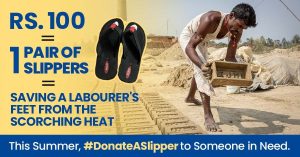2 Friends Help Kolkata Ragpickers Launch Their Own Sustainable Fashion Brand for Kids
Friends Arpita Chakraborty and Anushree Malhotra have launched Khudey, a sustainable children’s fashion brand that is empowering both children as well as ragpicker women of Kolkata’s Dhapa slum.
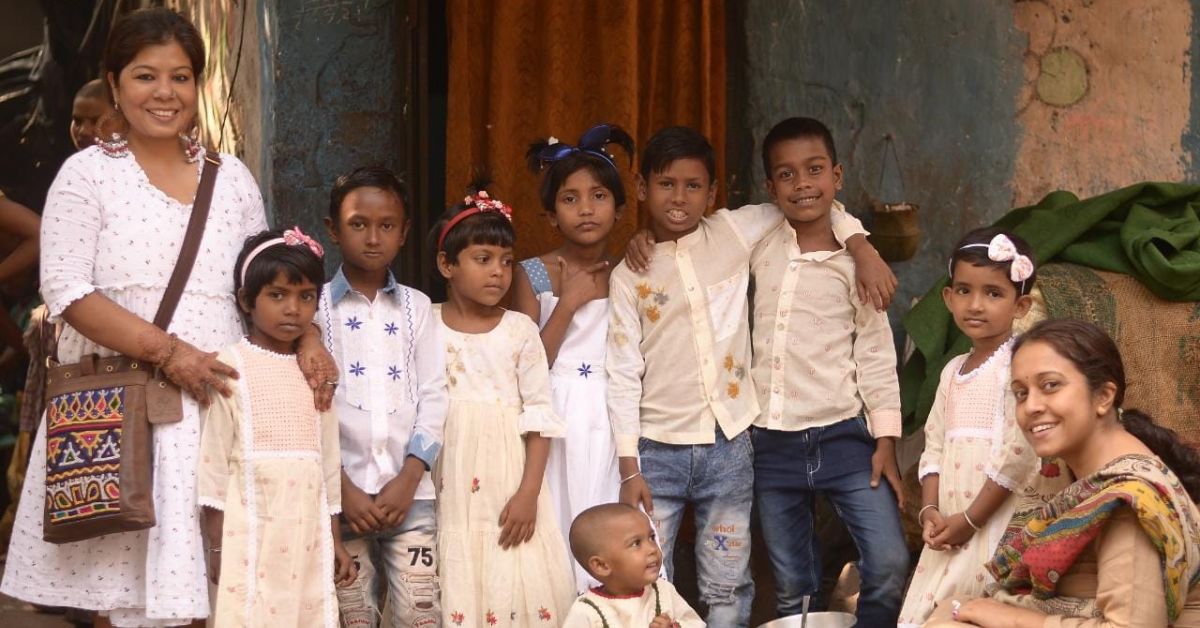
Every evening as the clock strikes half past four, the premises of Hatgachia Primary School in Kolkata transform from regular classrooms to a hub of activity.
Students learning on blackboards are replaced by women and children from the nearby Dhapa slum, who gather in these classrooms to learn fashion, embroidery, language, and more. Most of them are rag pickers living in the region, which is one of the largest slums in the country.
This training is part of the initiatives by Tanuz Vocational Training Society, a venture started by friends Arpita Chakraborty and Anushree Malhotra in 2008.
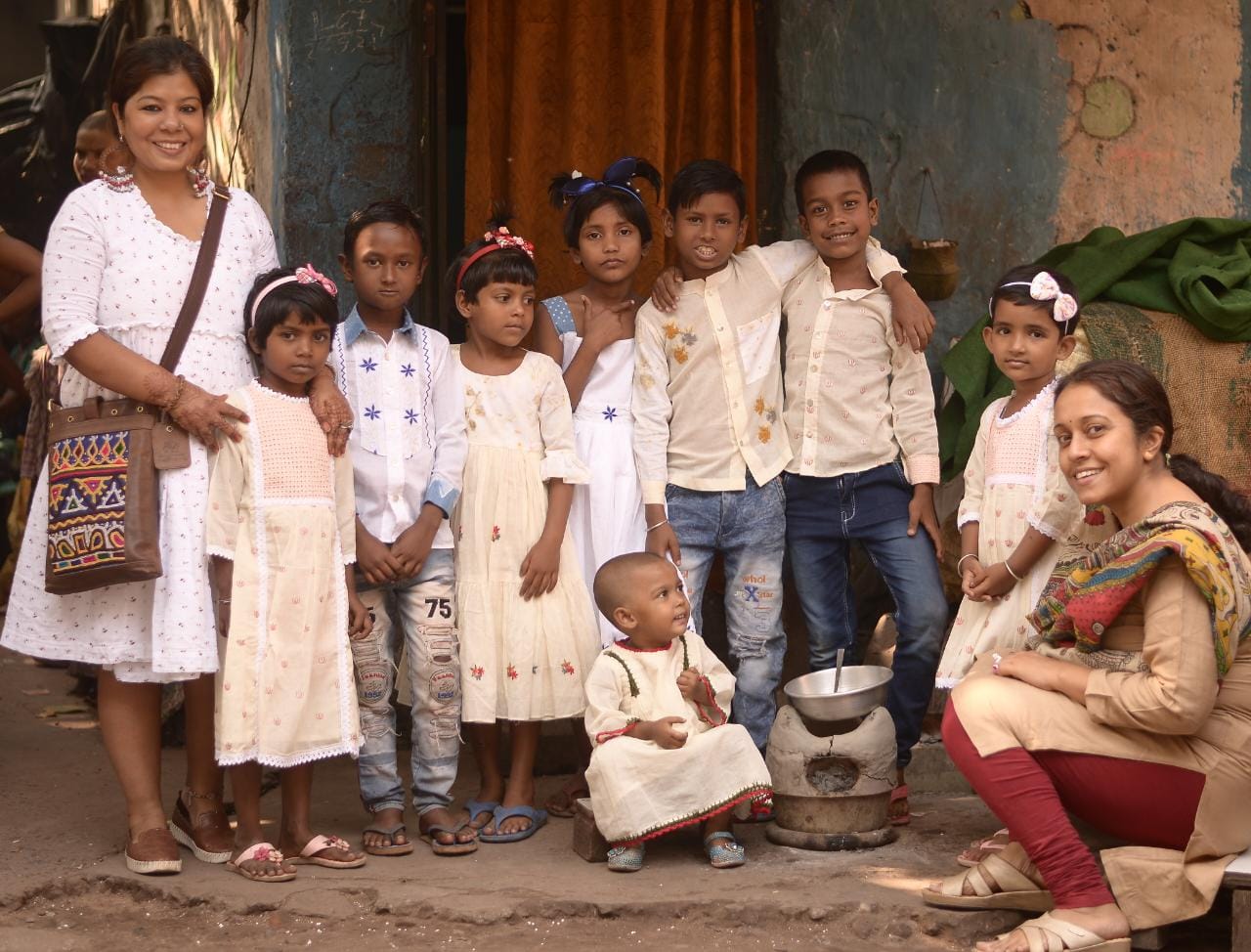
Through the years, the venture has evolved from focussing on only giving women training in stitching and tailoring to one that now empowers 90 members to sustain their families.
In conversation with The Better India, Anushree, a fashion designer, explains that when the COVID pandemic hit, the women’s lives were upturned. “A majority of these women’s husbands lost their jobs and entire families were devastated,” she notes.
Meanwhile, Arpita, a school teacher for many of the children at Dhapa, was cooking and distributing food to their homes, but this was not a long term solution.
This devastating reality brought the two women from seemingly diverse work backgrounds together. Together, they formed Khudey, a sustainable fashion brand for children that means “the little kid” in Bengali. With their venture, they envisioned that women would find a regular source of income and empower children to be more proactive and confident.
The idea was to train the mothers in stitching and embroidery, have the children model these clothes, and then sell the products at exhibitions.
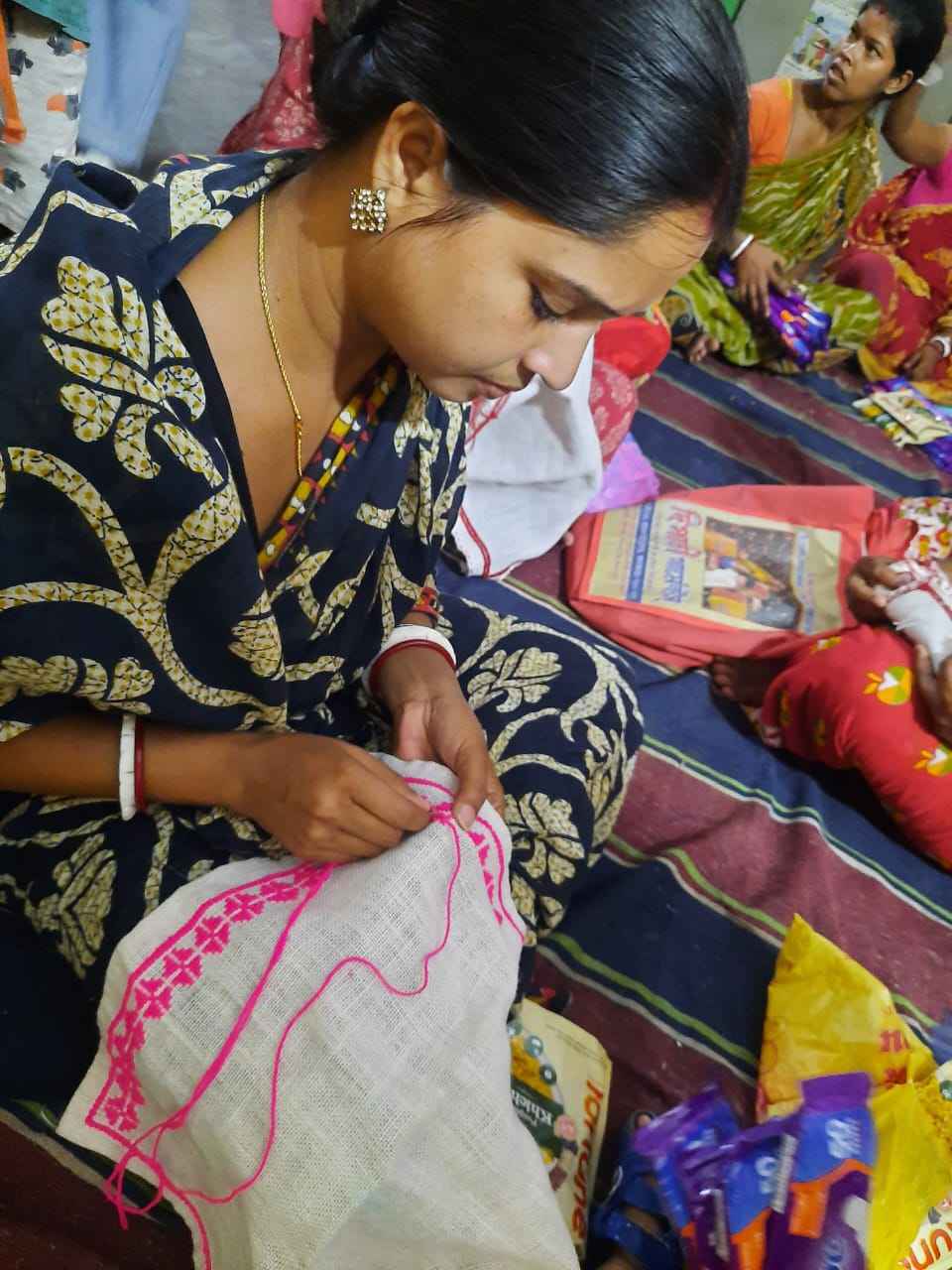
Starting a venture in a classroom
“When I’d visit these women to distribute food, they would share how they did not have any work in those days. As ragpickers, their primary source of work had been hit owing to the lockdown,” Arpita explains. “I taught many of these children at school and wanted to do my bit to help them cope.”
“I sought permission from the headmaster to let the women come to school during the day and spend some time here. The idea was to teach them tailoring and give them a few orders for garments so they could earn some money,” she says, adding that they hadn’t thought of getting the kids to model the clothes just yet.
The motive, says Anushree, was to make comfortable clothes that were different from “the flashy ones in the market”. After a few garments were ready, they had one of the children try on the clothes and “walk the ramp”.
“We posted a picture on social media and the love it got was amazing,” says Anushree, adding that this motivated them to turn this into a full-fledged sustainable fashion venture.
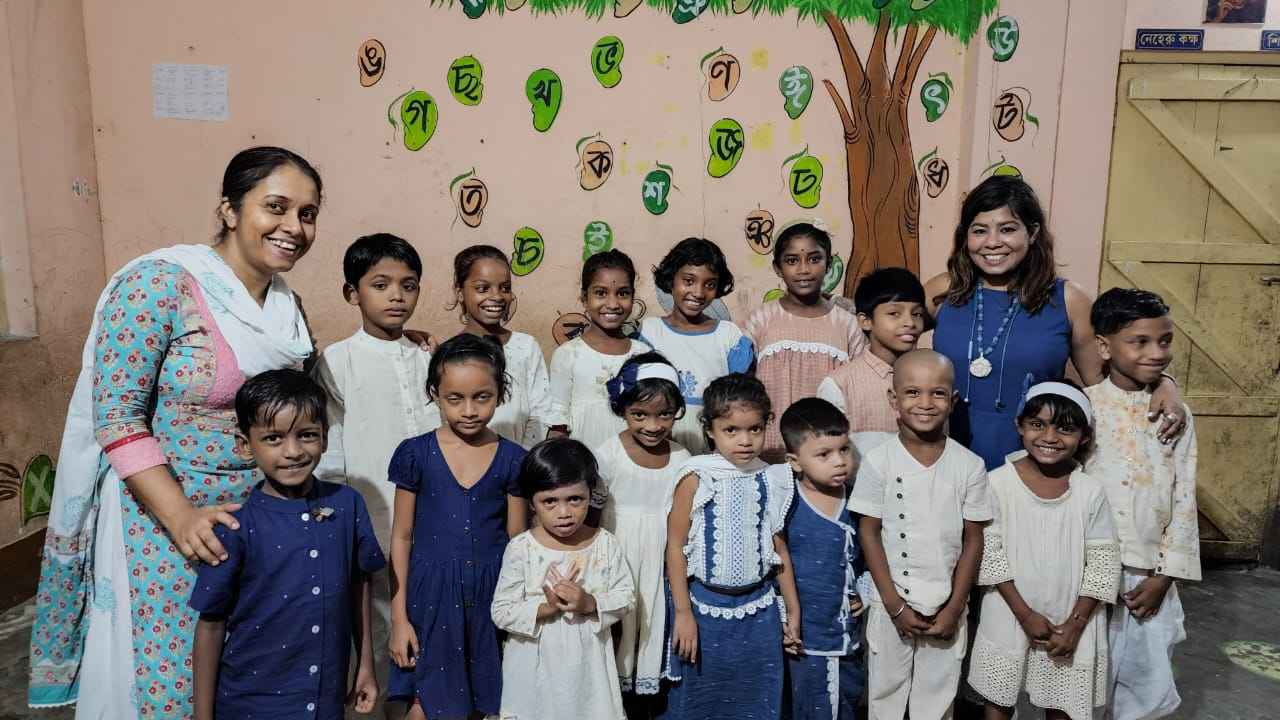
A holistic learning environment
As the pandemic eased and the lockdown was lifted, the headmaster had seen what a positive change had been brought in the lives of the women of Dhapa, and permitted the training to continue, albeit after school hours. Four classrooms were allotted for this.
With time, the friend duo started reaching out to nearby rotary clubs and colleges, offering opportunities to young girls who wished to volunteer and impart skills to the children and women.
Today, anyone who ventures into the primary school on the designated day at 4.30 pm will be greeted with a wonderful sight — women busy at their sewing machines, embroidering and selecting patterns, while the children are trained in language, reading, and oratory skills, and quizzed on general knowledge by students of Class 11 and 12 from nearby colleges.
“Our classes take place five days of the week, from 4.30 to 6.30 pm,” says Anushree, adding that four teachers from the school stay back and train the women in eco-printing. For this, the women use flowers such as marigolds, hibiscus, and periwinkle, as well as onion peels and turmeric.
“The fabric is treated with soya milk so that the print will stay on for a long time. The peels and petals are then placed on the fabric, which is rolled up and steamed for an hour. The next day it is unfolded and the printed fabric is ready,” she says.
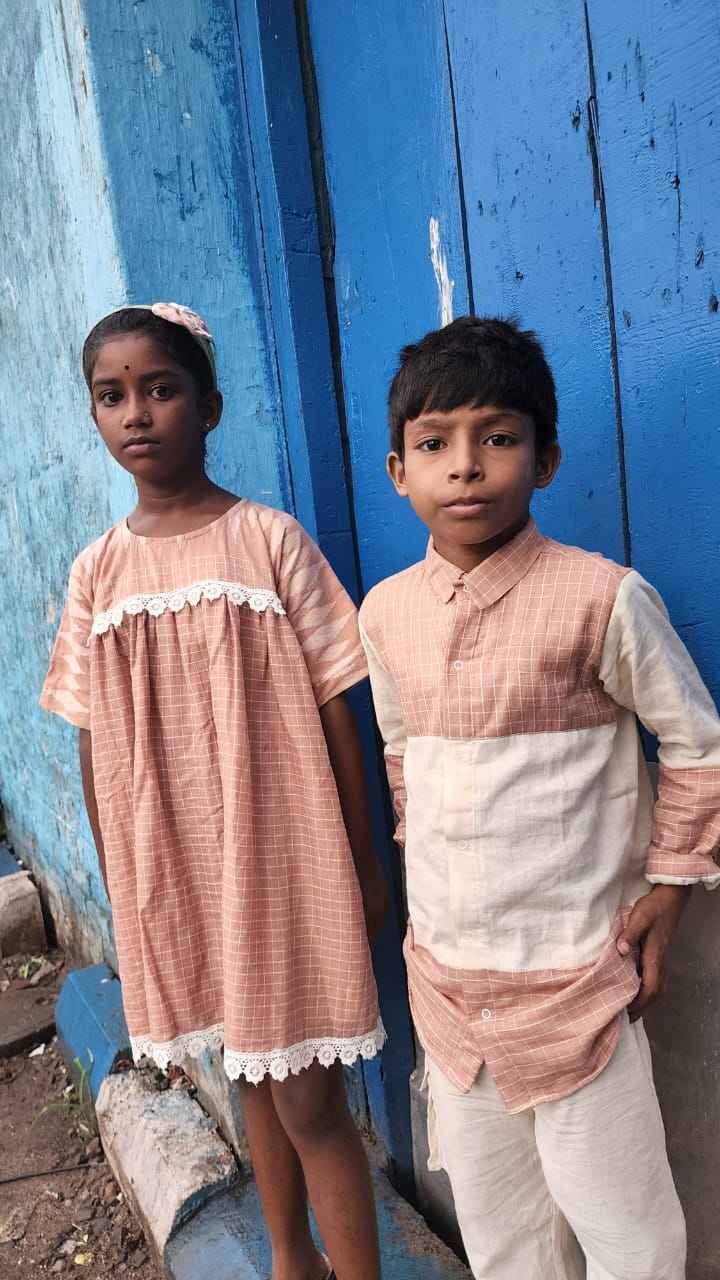
Empowering the women of Dhapa
“A lovely environment has been created here,” Anushree notes, explaining how women have fine-tuned their skills and formed areas of interest. “Some are great at crochet, while others are good at stitching. There are 10 women dedicated to machine embroidery. If we have several orders, they sometimes carry work home to complete.”
She goes on to add that once around 12 designs are ready, they organise a photoshoot where different children are given an opportunity to showcase their posing and fashion skills. The photo shoot is overseen by volunteer student photographers.
“It is a cycle of good,” says Anushree. “The women are being empowered through skill development and earning a regular income, while their children are gaining confidence and learning life skills.”
Anushree says 90 women are presently part of the sustainable fashion brand and the range of clothes and products have been sold at exhibitions across India including Siliguri and Guwahati. Their collection has children’s garments such as dresses, cross-stitched table runners priced at Rs 180 onwards, crochet coasters priced at Rs 100, and embroidered trays priced at Rs 250.
She adds that they wanted to stick to sustainable fashion and all the clothes are made of hand-woven fabric like khadi, jamdani and cotton. The women also earn through the aachar, vegetables, etc, that they cook during the classes.
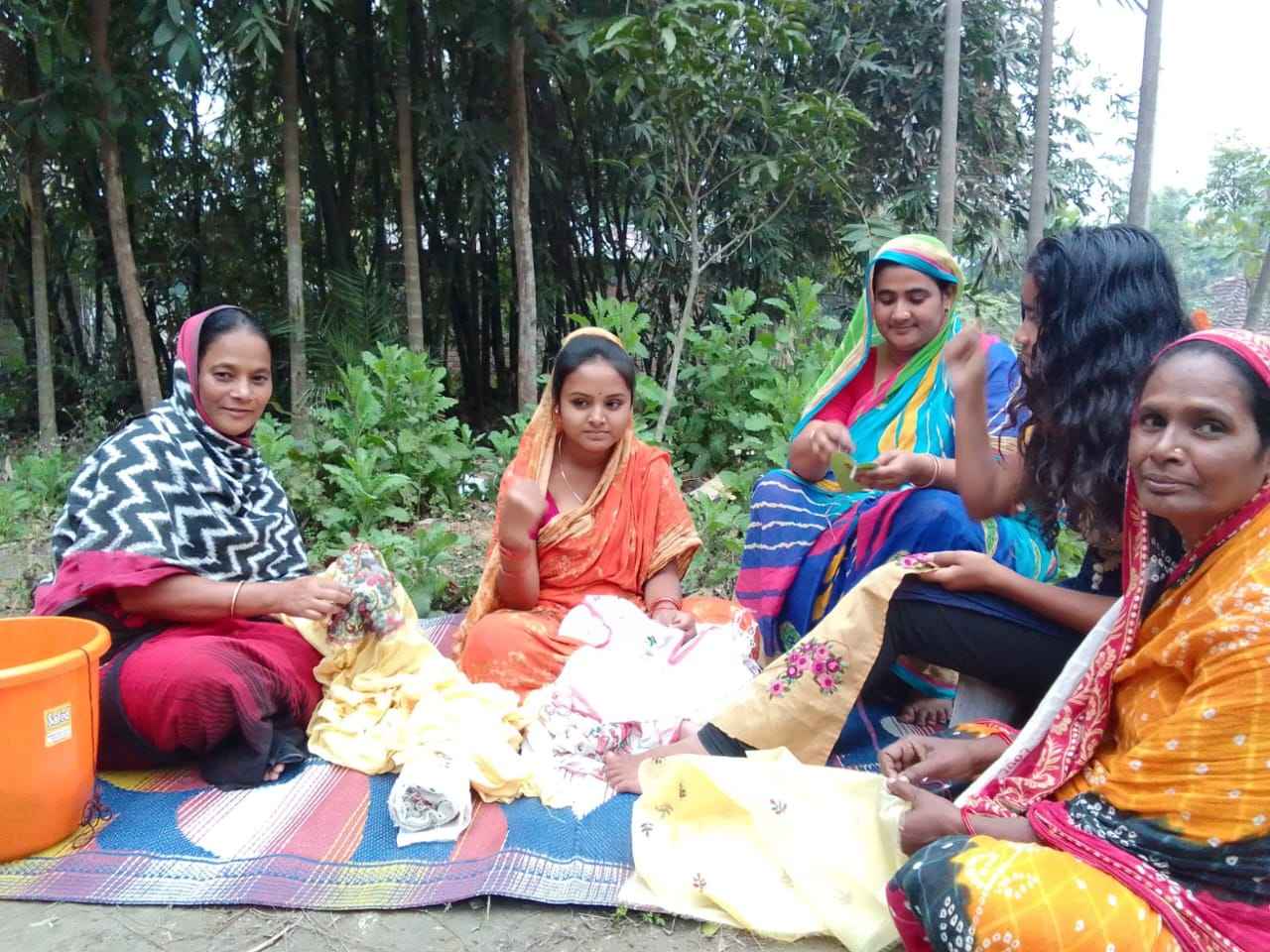
“The women receive 100 per cent of the profits,” says Anushree, adding that they see around 25 orders a month.
While the women are paid a stipend according to the amount of work they are able to take up and complete, Anushree says on an average, each gets around Rs 2,500 to Rs 3,000 a month.
Menoka Bauri, who has been associated with Khudey for the last one year, says it is a blessing to be part of this work. “I live in the area which serves as a dumping ground. But Tanuz gave me a chance to build a livelihood in handicrafts. I am so thankful for that,” she says.
Another beneficiary, Mausumi Bauri, echoes Menoka’s sentiment and says, “We have not just learnt a skill, but also received help in terms of nutrition kits and so much more from the organisation.”
Anushree and Arpita say that beyond building the Khudey brand and empowering the women of Dhapa, what is noteworthy is the children’s confidence.
“During events, we have star kids from Tollywood dress up in Khudey’s clothes and if you observe closely, you will see that the only barrier between a kid from a slum and a child from a wealthy background is exposure. Every child, including one from Dhapa, has so much talent. All they need is the right platform,” she says.
To purchase clothes from the brand you can contact Anushree and Arpita at 9903955300 and 9123963273.
Edited by Divya Sethu
Read more stories on sustainable fashion: Want a Sustainable Wardrobe? 10 Eco-Friendly Clothing Brands That Stand Out in The Noise
If you found our stories insightful, informative, or even just enjoyable, we invite you to consider making a voluntary payment to support the work we do at The Better India. Your contribution helps us continue producing quality content that educates, inspires, and drives positive change. Choose one of the payment options below for your contribution- By paying for the stories you value, you directly contribute to sustaining our efforts focused on making a difference in the world. Together, let’s ensure that impactful stories continue to be told and shared, enriching lives and communities alike. Thank you for your support. Here are some frequently asked questions you might find helpful to know why you are contributing?

This story made me
-
97
-
121
-
89
-
167




